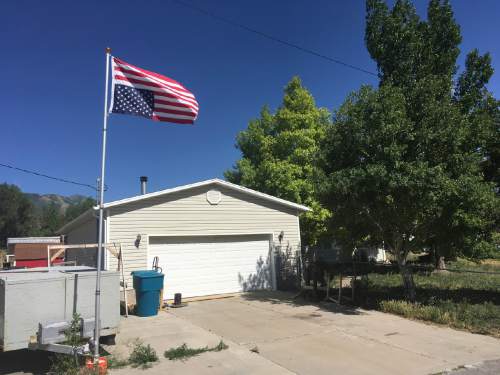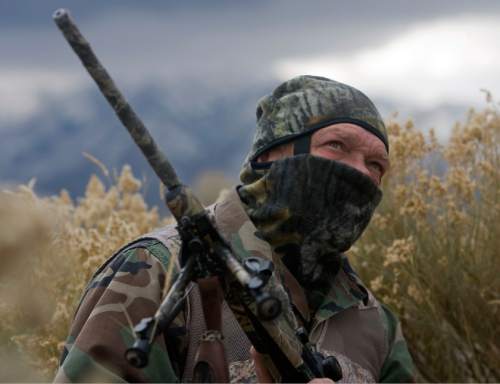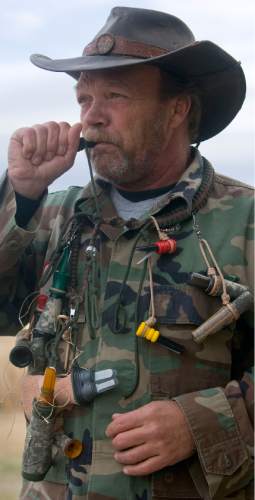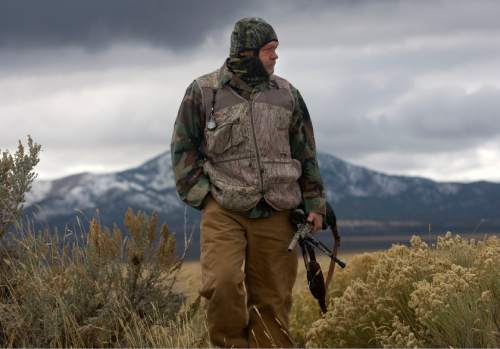This is an archived article that was published on sltrib.com in 2016, and information in the article may be outdated. It is provided only for personal research purposes and may not be reprinted.
An FBI agent testified during a Wednesday detention hearing that a Tooele County man showed no remorse when he thought — incorrectly — that he had bombed a Bureau of Land Management cabin on the Arizona Strip the night of June 21.
The federal defender for William Keebler, meanwhile, said undercover agents proposed the explosive types, drove Keebler to the location, placed the bomb, handed Keebler a remote trigger and told him to press the button three times.
Keebler knew the cabins to be unoccupied, said Lynn Donaldson, and his actions amounted to "an extreme act of disobedience, in the nature of vandalism."
If convicted, the 57-year-old Stockton resident faces a potential sentence of five to 20 years for attempted damage to federal property by means of explosive.
FBI agent Steve Daniels said two undercover FBI agents and other unspecified government personnel infiltrated Keebler's small militia as the result of Keebler's participation in a 2014 standoff near the southeastern Nevada ranch of Cliven Bundy. Daniels said the militia's members numbered about seven, including Keebler and the undercover personnel, around the time of Keebler's arrest last week
Daniels said Keebler repeatedly expressed an interest in using explosives during the yearlong investigation, and that even after Keebler had been arrested and advised of his Miranda rights, he told authorities that he led the mission to the remote slopes of Mount Trumbull, Ariz.
"It's a crime of violence," said federal prosecutor Andrew Choate. "It's detonating a bomb. It doesn't get too much more serious than detonating a bomb."
No action resulted Wednesday, because U.S. Magistrate Judge Dustin B. Pead wanted to review a six-minute video entered by the defense before announcing his decision Thursday afternoon.
But arguments filled in details of the story outlined in the charging documents, and they added a correction: LaVoy Finicum didn't accompany Keebler when he scouted the BLM cabins in October 2015, as was alleged in charging documents, Choate said. Although Keebler was then a guest at Finicum's house, Choate said, Finicum attended a family event that day.
Finicum, killed by Oregon state police in late January amid a 41-day occupation of an eastern Oregon wildlife refuge, paid to graze his cattle on an allotment near the cabins, and he was ordered to pay a $12,000 fine when his cattle were observed grazing before their permitted season in August 2015.
Finicum's widow, Jeanette, said in an email that her husband knew Keebler only briefly. In the months after his death, Keebler volunteered as security for the family and arranged events in the Tooele area at which Finicum's family members spoke.
Daniels said Wednesday that in addition to a BLM office in Salt Lake City's Gateway mall, Keebler scouted a mosque and an FBI office in Utah's capital.
Charging documents state that Keebler determined instead that it was best to damage vehicles and buildings "in the middle of nowhere."
Choate said the undercover presence resulted in a "strong" case and "essentially GoPro videos" of the event.
Daniels said Keebler was armed with an AR-15-style rifle and a .45-caliber handgun with "lots of ammunition," and that after attempting to detonate the explosive — which he thought he had accomplished — Keebler told agents he would assume "a covering position."
"He had committed himself to firing the first shots, if need be," Daniels said.
Daniels, pressed by Donaldson, said Keebler didn't resist arrest Wednesday at a gas station near Nephi, that Daniels knew of. Daniels added, however, that the agents were "lucky" Keebler had left his handgun on the floorboard of a vehicle. Daniels said he had inspected the gun previously and that it had a bullet in the chamber.
Donaldson said Keebler has lived in Utah for 12 years. (The Salt Lake Tribune wrote about him in December 2011, when he guided sport coyote hunters.) He was honorably discharged from the U.S. Army in 1987, Donaldson said, and his primary source of income is veterans disability.
Keebler had cancer in 2004 and a triple heart-bypass surgery in 2013, Donaldson said, though Choate said that Keebler showed himself to be in adequate health in the rugged terrain of northern Arizona mountains, with heat in excess of 90 degrees.
Donaldson said Keebler has had no criminal convictions since he was found to have driven on a suspended license in 1998 and convicted of driving under the influence in 1997.
Choate also asked for and received a stipulated protective order against Keebler "sympathizers or supporters" releasing information on social media about the agents who infiltrated the militia.
The courthouse entrance Wednesday was guarded by a handful of law enforcement personnel, including Department of Homeland Security officers with a bomb-sniffing dog.
Twitter: @matthew_piper









